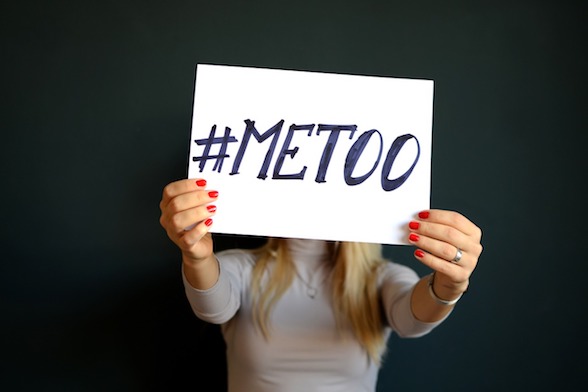Nominated as Time person of the year in 2017 were the “silence breakers”: women who spoke out against sexual predators, inappropriate behaviours and a constant fear of their environment. Calling out their aggressors and an ingrained culture of sexual harassment, silent breakers have been vocal for decades. But it seems in 2017 the world started to listen.
The Weinstein scandal and its repercussions in Hollywood, a place of creative genius and silent appearances, seemingly impermeable to such allegations, encouraged millions of people across the world to share and listen to countless stories of sexual harassment. Showing the pervasiveness of abuse and encouraging solidarity among survivors of harassment, the “Me Too” campaign was originally launched in 2007 by social activist Tarana Burke. In 2017, it has more than fulfilled its aims through the use of the hashtag #MeToo and its offspring in non-English speaking countries.
At E&M, we have realised that, while the scale of the “silence breaking” seems obvious to everyone, we are not always aware of the repercussions outside our respective countries. So we have collected a few stories to know how, if at all, European societies are confronting issues of sexual harassment.
Italy – by Nicoletta
Asia Argento, renowned Italian actor and director, was among the first actors to speak out of her violence suffered from Harvey Weinstein. Whilst the majority of the world was shocked and appalled by the Weinstein scandal and began to have constructive conversations on dismantling the power relations that allow these situations to occur, Italy was the exception.
Argento was met with a deluge of profanity, made culpable for the violence she had to endure. Perhaps the most infamous example was the article by right-wing Libero with the headline “first they give it away then they moan about it and pretend to regret it”. But the abuse came from across the political spectrum, genders and from all industries. Trans politician Vladimir Luxuria who most notably recently apologised for the vehement abused she cast upon Argento, had specifically focussed on the fact that if Argento took 20 years to denounce her violence, then it must be false. By many others she was told that she took too long to report, that she wasn’t as famous as the other ‘Silence Breakers’ and wanted to gain more recognition, that she consensually engaged in the act but had just regretted it, that she maintained relations with Weinstein after so must have been lying.
Apparently sometimes unwarranted sexual advances are just a man’s way to show his appreciation. Right? Because everyone is just waiting for a sexual predator’s ‘flirtacious’ validation.
The world was aghast with Italy’s appalling reaction, the vicious attack on a victim of sexual violence – discounting her brave act as attention-seeking and false. This sparked a whole debate on the fact that these women were unable to distinguish between flirting and sexual violence, because apparently sometimes unwarranted sexual advances are just a man’s way to show his appreciation. Right? Because everyone is just waiting for a sexual predator’s ‘flirtacious’ validation. But this reaction hardly comes a surprise to anyone familiar with Italy. Italy’s long patriarchal tradition fuelled by its strong catholic and conservative presence was consolidated by former prime minister Silvio Berlusconi’s deeply misogynistic traits. Simona Siri, in this powerful article for the Washington post, said that in fact Berlusconi’s long reign made Italian rape culture and embedded misogynism practically irreversible.
As a young Italian cis-woman, this a reality I am often confronted with. Even through conversations with relatives and friends, I notice how wide-spanning and what deep roots this misogyny has, effectively permeating through all levels of society. I salute Asia Argento for her brave words, and for standing up against all this abuse – showing the world the difficulties faced by Italian women. An Italy post-Weinstein is very much the same, it is just the rest of the world that is now a little bit more aware of the severe challenges against change for victims of sexual harassment in Italy.
United Kingdom – by Sam
Of course this wasn’t a surprise, in the grim way that the worst institutional and societal ills are never a surprise, really, or they shouldn’t be.
There’s a simple and unpalatable truth obscured by the way the Harvey Weinstein story has unfolded: what has been revealed so far barely scratches the surface.
Last summer I was sat in a pub, and the scale of the insidious sexual violence that pervades our world was laid bare.
Sat in a female-leaning group of friends, each woman present had their own traumatic tale. Whether a drink had been spiked in a student nightclub, they’d been groped, or worse, it was chastening to listen to the sheer matter-of-fact way my friends spoke about horrible things.
Of course this wasn’t a surprise, in the grim way that the worst institutional and societal ills are never a surprise, really, or they shouldn’t be.
I feel similarly about the world post Weinstein. Sexual relations in so many spheres are so devastatingly unpleasant and wrapped up in scary notions of who it is who holds power.
On a small scale, the Weinstein wave took down a few creepy and/or criminal names, and in the UK the media and politics is undergoing a (partial but much needed) reckoning.
The worst thing is the truth that most victims of sexual violence in this country have either normalised it, or are in no position to speak up.
The recent New York Times exposé of Vice magazine is, I think, indicative. Sexual violence was never confined to old men, it was never and it is never something that we can absolve our generation or our political or social allies from — no, it’s a systematic and violent element of our corrupted notion of society.
We have much still to do, or else dethroning Harvey Weinstein, Kevin Spacey, or whoever else, means shit.
Germany – by Friederike
It took the Germans some weeks, but finally the popular news outlets started reporting on #metoo. They reported on it happening elsewhere. They reported on it happening in the US (and in the UK). The media commented, but didn’t contribute. As if Germany was detached from sexual harassment in the workplace. Until now, Merkel hasn’t even mentioned it. That probably means it doesn’t exist in Germany. After all, she’s a woman.
There was no name dropping, not of women who experienced harassment or violence, and definitely not of perpetrators. We had media outlets report on it and call for a “much needed revolution”, but somehow the beloved German directness desperately (and successfully) avoided the pitfalls. A journalist wrote an article, announcing she had compiled a list of names of perpetrators, but she never published the list.
Hey hey hey though, we don’t all need names and fair trials to get to the bottom of sexism, Germany is dealing with it in its own terms. Germans did talk about other issues having to do with the #metoo debate at its periphery. We have been educated on “when the state of evidence is robust enough, so it’s legal to drop the name of a perpetrator”. We don’t want to break the law whilst trying to have a fair debate about sexism, do we now, Germany?
The debate is suffocated before it can begin.
Sarcasm off for a second: Undoubtedly, it is important to not start a random witch hunt. But the angle Germany takes is wrong: apparently doubting the women who experienced harassment and want to talk about it, is acceptable? So we just need to make sure they really, really have the factual ground for accusation? The debate is suffocated before it can begin. Maybe that’s why the journalist still hasn’t published that list.
Wait though, we had a tiny debate about sexism in October: Sawsan Chabli, state secretary for international affairs, was overseen at a public event, even though she sat on her assigned seat in the front row. The moderator of the event said something along the lines of “Oh, the state secretary must not have arrived yet…” when Chabli shouted: “No, here I am!” – and the moderator responded: “Oh woopsie, I didn‘t expect you to be so young – and pretty!”. Chabli was outraged, she felt belittled, and instantly shared this episode on social media. German media had a field day: Is Chabli overreacting? Did the moderator mean any harm? Are compliments still allowed? It’s a nice debate to have, but not the one we should be having, especially when it’s the only debate we’re having.
Germany isn’t ready. We think it’s better to have other debates first, so we know how to do it right when the debate really starts. Until then? We make sure our women are safe when celebrating the New Year in Berlin. The city of Berlin has announced a “women safety area” at the obligatory New Year’s festivities at the Brandenburg Gate this year. That’s a nice thought, but again – it’s the women who are inconvenienced by this proposal. Imagine a woman will be attacked or harassed outside the safety area: will the media blame her, or the perpetrator? I mean, she should have just gone to the safety area. Not doing that is basically asking for trouble, right? And make sure you know who attacked you and how and just gather the facts, before you speak up. And even then still: maybe it was just meant as a compliment?
I don’t think Germany will have a proper debate soon. We’ll debate about debates, but don’t expect more. We don’t have a problem if we don’t talk about it. Let’s do some more finger pointing instead and be shocked about the Weinsteins in the US. It’s just easier that way.
Romania – by Oana
In a country with a long-lasting, troubling history of domestic violence and a largely scornful attitude towards women and “women’s issues”, a number of only two cases of sexual harassment were reported to the National Council for Combating Discrimination in two years (2015-2016). Until September 2017, the police in Romania registered 35 cases of sexual harrassment, 8% fewer than in the previous year.
Being Romanian, having grown into a young woman in Romania, these numbers look far from realistic.
So why is sexual harassment underreported?, we all ask. Because of what people might say (mind you, Romania is largely orthodox. Its rapid transition from more than 40 years of communism rigueur to neoliberalism and hashtags has left cultural holes in the structure of society that some/most try to cover with traditionalist attitudes). Because what’s normal is defined by what the community considers normal. Because of the limited legal framework and social support available.
The #metoo campaign that got everyone talking made its way to Romania, where so many – public figures and friends – shared their personal stories of sexual harassment as a reaction to the Harvey Weinstein breakout. Scrolling through comments in Romania is maddening. These women are prostitutes (which is of course, apparently REALLY shameful), greedy for fame and money and only the mighty, holy Facebook commenter holds the key to higher morals and family values that the metoo-ers have left behind. Feminism and metoo are for so many in Romania false values imported from the West that people adopt in order to be in sync with the trendy West. There’s no way out: why did these women not declare it sooner. If they had, the same people would have accused the young girls of trying to get money and fame by wrongfully accusing serious men of sexual harassment. What’s even more painful is how many women brutally shame other women.
Recently, I talked to some old friends (guys) about someone in our school who was fingered by I can’t remember how many boys whilst drunk and about another who performed oral sex at 15 in a bathroom and was filmed by her classmates, shared on facebook with friends and parents. My friends laugh: these girls are not victims, they did it to themselves, some girls are like that. There’s no mention of the boys. Emotionally exhausted, I try to argue that it could have been anyone, maybe even me, their old friend. “No no, you’re different and some girls are like that.” And the banter carries on.
These are highly educated boys having an expensive beer on a quiet evening. In the meantime, the Parliament is deliberating whether to decriminalize sexual harassment as part of a series of legal changes that are equally confusing.
Of course hashtags do not equate with social justice but they got us talking.
Of course hashtags do not equate with social justice but they got us talking. They got us angry at dinner tables with confused family, at beer soireés with semi-friends about an issue entangled and delicate. All the talk, all the anger and maybe even the hashtags were necessary – they helped us start educating ourselves and men about what’s ok and what really isn’t. They helped us women start respecting ourselves more, respect each other more and demand the same from men.
Another look at the United States – by Allison
On the day of the 2016 Presidential election, hundreds of women flocked to the grave of American political activist, abolitionist, and famed suffragette, Susan B. Anthony. They came to place their ‘I Voted’ stickers on her gravestone after casting a ballot for who they hoped would become the first female president of the United States. Women decorated Anthony’s headstone because her efforts and those of so many other incredible suffragettes forced the creation of the 19th amendment, which made denying women the right to vote illegal and ultimately allowed women’s voices to be heard in the political arena for the first time.
I think of Susan B. Anthony frequently – whenever I’ve cast my ballot in an election, in all of the sexist experiences I’ve had in my short professional career, and now especially in connection with the post-Weinstein scandals. I think of her in part because #repealthe19th trended on twitter during the election and was chanted by Trump supporters at his rallies; I think of her also in part due to the fact that child-predator and recent Senate candidate Roy Moore once argued for repealing every amendment after the 10th, which would not just repeal women’s voting rights, but also one abolishing slavery. However, mostly, I think about Susan B. Anthony to remind me that women will always need to fight for our voices to be heard, and sometimes, despite the odds, we will win.
With these recent allegations, we’ve seen how our political system has always had a way of protecting its men from consequences of their actions. After five members of congress were revealed as sexual predators, we learned of an endless, taxpayer sourced fund that, to date, has paid out $17 million in settlements to victims of sexual assault by members of congress. But more revealing is how these recent allegations have shown this political system’s attempts to keep women out altogether. Journalists, whose job it is to hold politicians accountable have been looking the other way for decades, and worse, hiding their own, checkered histories from the public.
After women have come forward to tell their stories of assault by over a dozen journalists like Bill O-Reilly, Matt Lauer, and Charlie Rose, it seems we’ve failed to make the connection between their history of assault and their coverage of Hillary Clinton during the campaign. These men asked her sexist questions, interrupted her repeatedly during their interviews, and even at one point during the campaign, tried to hold her personally accountable for Bill Clinton’s own history of sexual assault, which admittedly deserves much more scrutiny. More than a dozen prominent journalists who covered the 2016 campaign have now been accused of sexual assault, not including the late CEO of far-right media network Fox News, Roger Ailes. These men directed the conversations of 2016 and cast Hillary Clinton as an untrustworthy, unlikeable, and manipulative Lady Macbeth type figure, all while allowing Trump to gloss over the tape where he openly brags about the ease with which he is able to assault women. Worse these narratives are still being perpetuated and many Trump supporters still actively repeat their support for Trump because Hillary was just “untrustworthy.”
We can no longer pretend women’s rights issues were settled with suffrage or civil rights in the 1960s. We can no longer pretend our misogynistic dumpster fire of a political system isn’t burning.
This process only gets worse when we consider what these men have worked to accomplish with their power through the legislative war on women’s reproductive rights. The recent tax bill and other various legislation includes anti-abortion language and allows insurance companies and employers to deny women access to birth control, which could ultimately force some women from the work force all together. Not only did these recent allegations reveal our society’s heinous treatment of women, but it uncovers a far more sinister structure to prevent women from participating in the conversation all together. If there is ever a silver lining to be seen in this all-out assault on women’s rights in the US, we can no longer pretend women’s rights issues were settled with suffrage or civil rights in the 1960s. We can no longer pretend our misogynistic dumpster fire of a political system isn’t burning.
Cover photo: Photo: surdumihail (Pixabay); Licence: CC0 1.0










